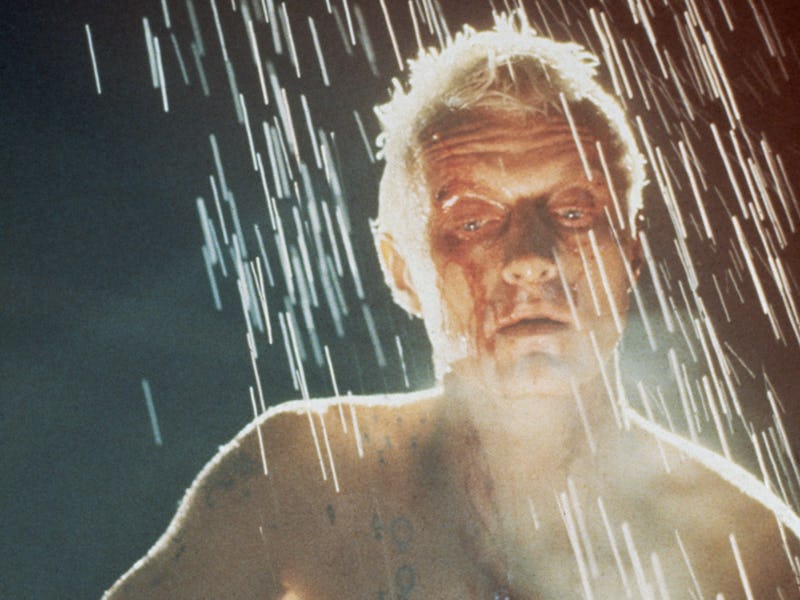How Rutger Hauer Made Harrison Ford "Disappear" in Blade Runner
A new documentary chronicles the life and work of Rutger Hauer.

In 2019, the legendary Dutch actor Rutger Hauer passed away. For cinephiles, his legacy was immense, ranging from films like Nighthawks to The Osterman Weekend, to Eureka, in which Hauer starred alongside the late Gene Hackman. And before his Hollywood breakthrough in Nighthawks, Hauer’s work in Dutch and German films was extensive. But, for science fiction and fantasy fans, his stardom is almost exclusively defined by his performance as the rogue replicant Roy Batty in the 1982 classic Blade Runner. Yes, fantasy fans and Ready Player One ‘80s completists will argue that Hauer’s turn in Ladyhawke is just as iconic, but history has proven that if there’s one role that truly became his legacy, it’s that of the baddie in Blade Runner.
Appropriately, a new documentary about the life of Rutger Hauer takes its title from a line from the movie, a line that Hauer himself helped craft. The documentary is called Like Tears in Rain, and it's directed by Hauer’s goddaughter, Sanna Fabery de Jonge, who narrates the opening moments of the movie to give the documentary historical context. Naturally, this documentary isn’t only about Blade Runner or science fiction. And yet, the revelations and observations about how Hauer was eerily connected to Blade Runner are a huge part of the movie and, certainly, a must-see for any serious student of sci-fi cinema.
Featuring an incredible number of celebrity interviews, all friends, colleagues, collaborators, or admirers of Hauer, Tears in the Rain reminds you of the actor’s hugeness simply by demonstrating the number of lives he touched. Watching Whoopi Goldberg talk about her utter love for Hauer and then having that juxtaposed with Paul Verhoeven’s emotional reflections about the same man is not only deeply affecting but fascinating. From Vincent D’Onofrio to Mickey Rourke, to Miranda Richardson and Robert Rodriguez, the number of lives and careers that Hauer inspired is seemingly endless.
But, just as the movie takes its title from Blade Runner, the discussions of that film and how Hauer changed it forever are central to what makes the documentary crucial for all future discussions about Blade Runner.
“He really turned that into a role for the ages,” Robert Rodriguez says in the movie. Meanwhile, Mickey Rourke asserts that, “He made Harrison Ford disappear. I’m sorry. No disrespect to Harrison Ford, but you couldn’t wait for the bad guy to come on the film.”
As the documentary details (and has been revealed before) Hauer collaborated specifically with director Ridley Scott to create aspects of the final speech given by Roy before he perishes. The famous “tears in the rain” speech wasn’t entirely improvised per se, but Hauer was the power behind creating those words and putting that version of the character on screen.
The documentary also goes slightly further on this point than other Blade Runner documentaries or behind-the-scenes books (like Dangerous Days or Future Noir) and reveals that it’s not just the “tears in the rain speech” that Hauer helped craft but also the entire character of Roy Batty.
In an archive interview from Hauer himself, the actor explains how he convinced Ridley Scott to let him create a character that was more dynamic than what was on the page.
Rutger Hauer in Blade Runner.
“Can I put anything in there that I kind of like?” Hauer said of his conversations with Scott, noting that he wanted to give the character “a sense of poetry, a sense of sexuality, things that belong to humans, rather than batteries.”
In Blade Runner, the motto of the Tyrell corporation is “More human than human,” and with this performance as Roy Batty, that’s exactly what Hauer did, create a character that felt extra-human, that yearned and desired more than an actual human could, because his life was, by design, much shorter and more painful.
In real life, Hauer passed away in 2019, exactly the same year that Blade Runner was set, meaning his vibrant life is strangely echoed in his immortal performance on that rooftop. For decades, there’s been a bit of a mystery as to how Hauer was able to make us believe that he had indeed and in fact seen things “you people wouldn’t believe.” But now, thanks to this documentary, the power and soul behind those words have been brought into the light.